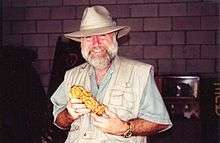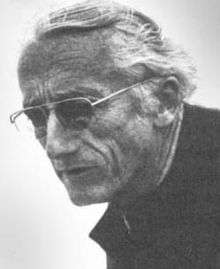List of undersea explorers
This is a list of amateur and professional explorers of the oceans, including Archaeologists, Treasure hunters, Biologists, Marine Geologists, Geophysicists, Ocean Engineers, Oceanographers, Submersible Designers, Pilots of Submersibles, Cave Divers, Cavers, and Speleologists, and First Generation Diving Safety Officers.
Archaeologists and treasure hunters

- Marine archaeologists (also known as maritime archaeologists) are persons working in the discipline of Marine Archaeology (also known as maritime archaeology) and study human interaction with the sea, lakes and rivers through the study of vessels, shore side facilities, cargoes, human remains and submerged landscapes. One speciality is underwater archaeology, which studies the past through any submerged remains. Another specialty within maritime archaeology is nautical archaeology, which studies vessel construction and use.
- Treasure hunters sell the artifacts (cannons, bottles, coins, specie, bullion - also known as treasure) they find on shipwrecks and, when proficient at archaeology and working within the law, they are the capitalists of marine archaeology. Treasure hunters without proficiency in archaeology and salvaging historical artifacts without government permits are looters.[1]
- Robert Ballard (born 1942), underwater archaeologist, professor at University of Rhode Island
- George F. Bass (born 1932), pioneer underwater archaeologist, author, founded Institute of Nautical Archaeology in 1973
- Mel Fisher
- Robert F. Marx (born 1933), pioneer underwater archaeologist, prolific author
- Mark M. Newell, founder of Georgia Archaeological Institute
- Alan Riebe, unaffiliated deep sea explorer, shipwreck historian, author
- William R. Royal (March 16, 1905 – May 8, 1997), explorer of Warm Mineral Springs and Little Salt Spring in Florida
- E. Lee Spence (born 1947), pioneer underwater archaeologist and treasure hunter, prolific author of books, maps and articles on shipwrecks, editor, a founder of Sea Research Society in 1972
- Robert Sténuit (born 1933), underwater archeologist and the world's first aquanaut
- Peter Throckmorton (died 1990), pioneer underwater archaeologist, director Sea Research Society
- Robert H Pritchett III (born 1962) Explorer, author, shipwreck surveyor, President and CEO Global Marine Exploration Inc. www.gmexploration.com Pewter wreck of Punta Cana, Cape Canaveral Shipwrecks, 42 colonial period shipwreck finds to credit
- William G Seliger (Born 1973) Explorer, author, shipwreck surveyor, COO Global Marine Exploration Inc. www.gmeexploration.com. Credited with discovering or working on the following wrecks: Consolacion shipwreck, Pewter wreck of Punta Cana, multiple wrecks in the southern Dominican Republic, multiple wrecks around Cape Canaveral, and many more colonial period shipwreck finds.
Biologists

- Marine biology, or Biological oceanography is the study of the plants, animals and microbes (biota) of the oceans and their ecological interaction.
- Ali Abdelghany (born 1944), Egyptian marine biologist
- Jakob Johan Adolf Appellöf (1857–1921), Swedish marine zoologist.
- Samuel Stillman Berry (1887–1984), U.S. marine zoologist.
- Henry Bryant Bigelow (1879–1967), U.S. marine biologist.
- Rachel Carson (1907–1964), American Marine Biologist and Author.
- Carl Chun (1852–1914), German marine biologist
- Jacques-Yves Cousteau (1910–1997), French marine biologist and explorer
- Charles Darwin (1809–1882), wrote Structure and Distribution of Coral Reefs (1842) while aboard the HMS Beagle
- Anton Dohrn (1840–1909), German marine biologist
- Sylvia Earle (born 1935), American oceanographer
- Hans Hass (born 1919), Austrian marine biologist and diving pioneer
- Gotthilf Hempel (born 1929), German marine biologist
- Ilham Artüz (1924–1993), Turkish Marine Biologist and Oceanographer
- Johan Hjort (1869–1948), Norwegian marine zoologist and one of the founders of ICES
- Bruno Hofer (1861–1916), German fisheries scientist
- Emperor Showa of Japan (1901–1989), jellyfish taxonomist
- Uwe Kils (born 1951), German marine biologist
- August David Krohn (1803–1891), Russian/German zoologist
- William Elford Leach (1790–1836), English zoologist and marine biologist
- Nicholai Miklukho-Maklai (1846–1888), Russian marine biologist and anthropologist
- Sir John Murray (1841–1914), Scots–Canadian marine biologist
- Wheeler J. North (1922–2002), American marine biologist and diving pioneer
- Ed Ricketts (1897–1948), American marine biologist noted for a pioneering study of intertidal ecology
- Harald Rosenthal (born 1937), German hydrobiologist known for his work in fish farming and ecology
- Michael Sars (1809–1869), Norwegian theologian and biologist
- Georg Ossian Sars (1837–1927), Norwegian marine biologist
- Gunnar Thorson (1906–1971), Danish marine biologist
- Ruth Turner (1915–2000), marine biologist
- Charles Wyville Thompson (1832–1882), Scottish marine biologist
Source: List of biologists.
Marine Geologists and Geophysicists
- Robert Ballard (born 1942)
- Kathryn D. Sullivan (born 1951), Marine Geologist, Astronaut, Formally: Chief Scientist of NOAA, Assistant Secretary of Commerce for Environmental Observation and Prediction and Deputy Administrator for the National Oceanic and Atmospheric Administration. Currently (4 June 2013) serving as Acting Under Secretary of Commerce for Oceans and Atmosphere and Acting NOAA Administrator.
Ocean Engineers
- Ocean engineers study the ocean environment to determine its effects on ships and other marine vehicles and structures. Ocean engineers may design and operate stationary ocean platforms, or manned or remote-operated sub-surface vehicles used for deep sea exploration.
Oceanographers
- Oceanography (from the greek words Ωκεανός meaning Ocean and γράφω meaning to write), also called oceanology or marine science, is the branch of Earth Sciences that studies the Earth's oceans and seas. It covers a wide range of topics, including marine organisms and ecosystem dynamics; ocean currents, waves, and geophysical fluid dynamics; plate tectonics and the geology of the sea floor; and fluxes of various chemical substances and physical properties within the ocean and across its boundaries. These diverse topics reflect multiple disciplines that oceanographers blend to further knowledge of the world ocean and understanding of processes within it: biology, chemistry, geology, meteorology, and physics.
- John Knauss
- Roger Revelle
- [Sylvia Earle]
Submersible Designers and Pilots

- William Beebe (July 29, 1877 – June 4, 1962)
- Graham Hawkes
- Edwin Albert Link (July 26, 1904 – September 7, 1981)
- Phil Nuytten
- Auguste Piccard
- Jacques Piccard
- John Pritzlaff
- Allyn Vine
- Don Walsh
Cave Divers (Cavers and speleologists)
- Cave diving is one of the most challenging and potentially dangerous kinds of diving and presents many diving hazards. Cave diving is a form of penetration diving, meaning that in an emergency a diver cannot ascend directly to the surface due to the cave's ceilings, and instead may have to swim horizontally. The underwater navigation through the cave system may be difficult and exit routes may be at considerable distance, requiring the diver to have sufficient breathing gas to make the journey, resulting in potential deep diving risks.[2]
- Graham Balcombe (8 March 1907 – 19 March 2000), a founder of the Cave Diving Group
- George Benjamin, cave diving pioneer[3]
- Jeff Bozanic
- Sheck Exley (April 1, 1949 – April 6, 1994), cave diving pioneer
- Steve Gerrard
- Nuno Gomes (born 1951), South African diver, holder of world records for deep diving and deepest cave dive
- Jochen Hasenmayer (born 1941), German cave diver
- Jarrod Jablonski (born 1969), pioneering technical diver and record setting cave diver
- Artur Kozłowski (17 October 1977 – 5 September 2011), Polish cave diver who died on a dive in Ireland
- Jon Lindbergh (born 1932), oldest surviving son of Charles Lindbergh
- Agnes Milowka (23 December 1981 – 27 February 2011), Australian technical diver, underwater photographer and author
- David Shaw (1954–2005), Australian cave diver who died attempting to recover the body of another diver from Bushman's Hole in South Africa
- Jack Sheppard (31 March 1909 – 14 July 2001), pioneer of cave diving in the United Kingdom and a founder of the Cave Diving Group
- Don Shirley (born 1957), English cave diver
- Wesley C. Skiles (March 6, 1958 – July 21, 2010), documentary filmmaker
- Parker Turner
- Bill Stone (born 1952), American caver and explorer, known for exploring deep caves, sometimes with autonomous underwater vehicles
- John Zumrick
- Robert H Pritchett III ( Born 1962) Explorer, surveyor, ex Cave Instructor, Explored caves in Bermuda, Florida, Bahamas, Dominican Republic, Mexico, Haiti
First Generation Diving Safety Officers
A Diving Safety Officer (DSO) is a person (typically a University Official) appointed by an institution's responsible administrative officer or designee. He or she must be trained as a scientific diver, be a full member of the American Academy of Underwater Sciences and be an active underwater instructor from an internationally recognized certifying agency. He or she is responsible, for the conduct of the scientific diving program of the institution, including the conduct of training and certification, approval of dive plans, maintenance of diving records, and ensuring compliance with all relevant regulations.
This organizational structure goes back to the model developed at the Scripps Institution of Oceanography in the early 1950s. The model spread from there to the other campuses of the University of California, then to other California institutions and then nationwide. It served as the model accepted by the American Academy of Underwater Sciences and OSHA.
Those individuals who were part of the first generation of Diving Officers often had the opportunity to participate in many different undersea exploration programs and made singular contributions to those programs as well as the world of diving and submersibles.
- Lloyd Austin - University of California at Berkeley
- Richard Bell - University of California at Davis
- Dennis Divens - University of California at Santa Barbara
- John Duffy - California Department of Fish and Game
- Glen Egstrom - University of California at Los Angeles
- John Erickson - University of Washington
- Walt Hendricks Sr. University of Puerto Rico
- Connie Limbaugh - Scripps Institution of Oceanography
- Tom Mount - University of Miami
- Dave Owens - Woods Hole Oceanographic Institution
- Phillip Sharkey - University of Rhode Island
- Lee Somers - University of Michigan
- Jim Stewart - Scripps Institution of Oceanography
- Tommy Thompson - Moss Landing Marine Laboratory
References
- ↑ Ethics in Underwater Archaeology (Capitalism versus Socialism in Underwater Archaeology) by E. Lee Spence
- ↑ "Cave diving - Hazards." Oneness Commitment. 1 1 <http://www.experiencefestival.com/cave_diving_-_hazards>.
- ↑ Burgess, Robert F. (1999). "To the Cellars of the Sea". The Cave Divers. Locust Valley, New York: Aqua Quest Publications. pp. 154–166. ISBN 1-881652-11-4. LCCN 96-39661.